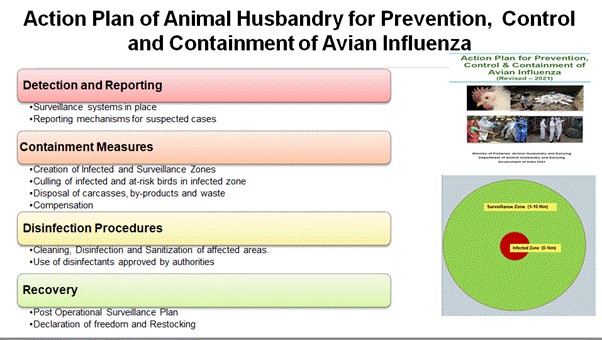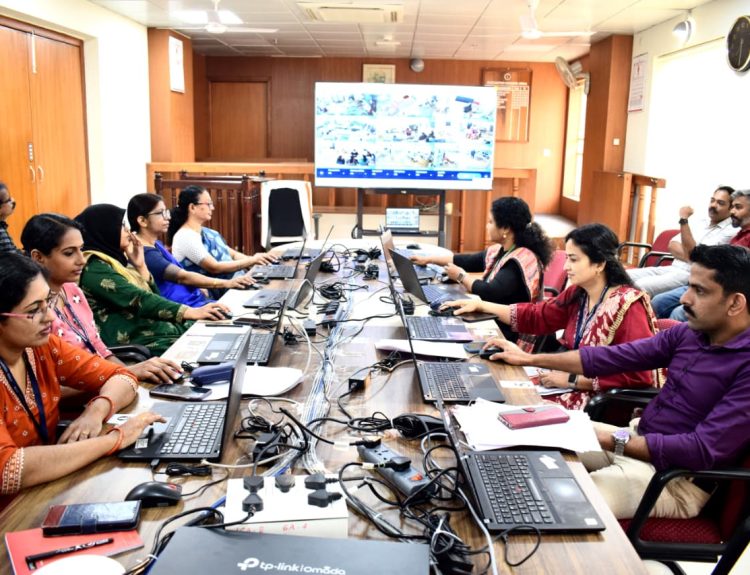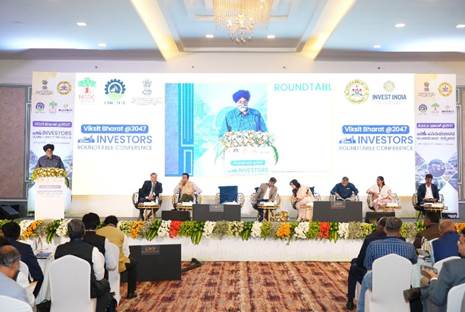The Department of Animal Husbandry & Dairying (DAHD) under the Ministry of Fisheries, Animal Husbandry and Dairying held a high level meeting on 4th April 2025 in New Delhi to discuss the recent outbreaks of Avian Influenza (Bird Flu) in the country. Chaired by Smt. Alka Upadhyaya, Secretary DAHD, the meeting brought together scientific experts, poultry industry representatives and policymakers to review the current situation of avian influenza and explore strategies to contain the disease and prevent its spread.
A three-pronged strategy to prevent and control Bird Flu has been decided by DAHD in consultation with the stakeholders. It encompasses Stricter Biosecurity Measures wherein poultry farms must enhance hygiene practices, control farm access and follow stringent biosecurity protocols to minimize the risk of infection, Strengthened Surveillance and Mandatory Registration of Poultry Farms to enhance disease tracking and control (All poultry farms must register with state animal husbandry departments within a month. The government has urged poultry industry stakeholders to ensure 100% compliance with this directive).
Speaking at the meeting, Smt. Alka Upadhyaya emphasized, “Protecting our poultry sector is critical for food security and rural livelihoods. Strict biosecurity, scientific surveillance, and responsible industry practices are essential in our fight against Bird Flu.” Additionally, Secretary DAHD stated the need for developing a predictive modelling system for early warning and environmental surveillance which would enable proactive disease detection and response, minimizing the risk of outbreaks and protecting the poultry industry. DAHD has permitted the use of the H9N2 (Low Pathogenic Avian Influenza) vaccine, developed by ICAR-NIHSAD, Bhopal, which is now available commercially. A national study will evaluate the vaccine’s effectiveness of LPAI vaccination. The meeting also extensively discussed the possibility of allowing the use of a vaccine against Highly Pathogenic Avian Influenza (HPAI) in India. Representatives from the poultry industry urged the government to explore vaccination as a strategy to prevent further economic losses in the sector. Scientific experts highlighted that currently available HPAI vaccines do not provide sterile immunity but only reduce virus shedding. Given these complexities, it was agreed that further scientific evaluation is needed before making a policy decision. The meeting recommended conducting detailed science-based assessments to determine the feasibility of HPAI vaccination in India. Research efforts have also been initiated to develop an indigenous HPAI vaccine following global best practices.
The meeting saw participation from top animal health experts and leading poultry industry players including poultry vaccine manufacturers, poultry associations and government & research institutions like ICAR-NIHSAD, ICAR-IVRI, ICAR-CARI, ICAR-NIVEDI, and ICAR-Directorate of Poultry Research.
About Avian Influenza and Current Status in India
Avian Influenza is a highly infectious viral disease affecting birds, with occasional transmission to mammals. Since its first detection in India in 2006, outbreaks have been reported annually across multiple states. This year, the virus has shown cross-species transmission, impacting not just poultry but also wild birds and even big cats in some areas. Currently, six active outbreak zones remain in Jharkhand, Telangana, and Chhattisgarh in the country.
Present situation on HPAI (From 1st January-4th April 2025)
Domestic Poultry
Parameter
Details
States Affected
Maharashtra, Chhattisgarh, Jharkhand, Andhra Pradesh, Madhya Pradesh, Telangana, Karnataka, Bihar (Total: 8 states)
Total Number of Epicentres
34
Active Epicentres
6 (3 States – Jharkhand (Bokaro and Pakur), Telangana (Ranga Reddy, Nalagonda and Yadadri Bhuvanagiri & Chhattisgarh (Baikunthpur, Korea)
Non Poultry Species Affected (From 1st January-4th April 2025)
Name of the State
Species affected
Maharashtra
Tiger, Leopard, Vulture, Crow, Hawk and Egret
Madhya Pradesh
Pet Cat
Rajasthan
Demoiselle crane, Painted Stork
Bihar
Crow
Goa
Jungle Cat
Comprehensive Approach to Controlling Avian Influenza
The Department of Animal Husbandry & Dairying (DAHD) has implemented a series of initiatives to control and prevent the spread of Highly Pathogenic Avian Influenza (HPAI) in India. The country follows a strict “detect and culling” policy, which involves culling infected birds, restricting movement, and disinfecting areas within a 1 km radius of outbreaks. States have been instructed to report daily on control measures, with increased surveillance and preparedness, especially during winter when migratory birds pose a higher risk. Surveillance for HPAI has also been expanded to non-poultry species, with negative results from tested cattle, goats, and pigs. In the global effort to combat potential pandemics, India has shared sequencing data of H5N1 isolates and related samples with international networks. Central teams, along with the National Joint Outbreak Response Team, are being deployed to manage outbreaks, and regular coordination meetings are being held with State Animal Husbandry Departments and other relevant authorities, including the Health and Wildlife Departments. India follows a test-and-cull policy to contain Avian Influenza outbreaks. Under the Livestock Health and Disease Control Scheme, the government compensates affected farmers for culled birds, destroyed eggs, and feed, with costs shared 50:50 between the Centre and States.








